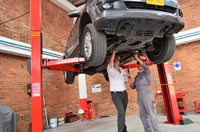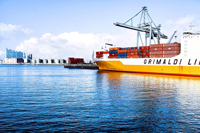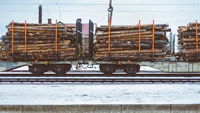 Being an auto mechanic can be tense. If someone brings a toaster in for repairs, you might be out the twenty bucks it costs to replace it. If you make a serious mistake while repairing a car, you’re looking at a slightly bigger insurance claim. People trust you with one of the most important things they own, it’s what they use to get to work, it’s how they pick up their kids, it’s what they ride in to take a vacation. Serious mistakes are relatively few when you’re a professional mechanic, but they can happen. Add to this the fact that you have a team of people working in a noisy, dangerous environment, and it’s no wonder most mechanics insurance packages are pretty robust.
Being an auto mechanic can be tense. If someone brings a toaster in for repairs, you might be out the twenty bucks it costs to replace it. If you make a serious mistake while repairing a car, you’re looking at a slightly bigger insurance claim. People trust you with one of the most important things they own, it’s what they use to get to work, it’s how they pick up their kids, it’s what they ride in to take a vacation. Serious mistakes are relatively few when you’re a professional mechanic, but they can happen. Add to this the fact that you have a team of people working in a noisy, dangerous environment, and it’s no wonder most mechanics insurance packages are pretty robust.
In short, here’s what needs covered:
- Garage Liability
If you’re running a place of business, then some sort of liability policy is par for course. In a garage, your garage liability coverage will provide protection beyond what commercial property liability can offer. A standard commercial liability policy might come with a lot of catches given the nature of the heavy machinery and dangerous work involved in running a garage.
- Equipment Breakdown Coverage
Also known as “boiler and machinery” coverage, this type of insurance covers you for everything from burnout and operator error to power surges and mechanical breakdown. We sometimes forget that heavy machinery can actually be quite delicate against certain damages.
- Garage Keepers Coverage
This is the one that’s going to protect you from a lot of potential lawsuits. Garage keepers coverage is there to ensure that you have a backup plan should something happen to a customer’s vehicle. This is another enhancement to commercial liability. In an office setting, a visitor might pinch their finger in a copy machine. In a garage setting, a malfunctioning ramp could lead to serious axle damage that you don’t want to cover out of pocket.
This is all in addition to the coverage that you would have in any workplace, of course. You need to be protected from things like theft and fire, you need coverage to provide for workers compensation and so on. The above-listed auto mechanics insurance policies simply mean that, even in a workplace as potentially volatile as an auto garage, you, your customers, and your employees will be covered just in case something goes wrong that couldn’t go wrong in an office or a grocery store.














